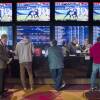After years of debate and weeks of regulatory wrangling, legal sports betting officially arrives in Massachusetts at 10 a.m. Tuesday — at least in part. The state’s three casinos — Encore Boston Harbor in Everett, Plainridge Park Casino in Plainville and MGM Springfield — will open their sportsbooks and begin taking bets, while the state Gaming Commission continues to work toward an anticipated March launch date for mobile-only sports betting.
It’s the biggest change in the Massachusetts gambling landscape since the opening of the casinos first authorized under a 2011 law, and a day that’s been eagerly awaited by both sports fans and the elected officials who pushed to legalize wagering on athletic events.
Here are four things to know as sports betting kicks off in Massachusetts.
Legal betting begins with fanfare, and big names.
Each of the three casinos is marking the start of sports wagering with its own special event, all featuring athletes with Massachusetts ties on their marquees. Boston Bruins legend Ray Bourque will be on hand for MGM Springfield's inaugural bet, and former New England Patriot Rob Ninkovich will take part in the festivities at Plainridge Park Casino. Encore Boston Harbor has a slew of athletes on its morning event roster -- former Bruin Shawn Thornton, former Patriots Ty Law and Matt Light, former Boston Celtics Cedric Maxwell and Eddie House, former Red Sox outfielder Johnny Damon, and hockey player Angela Ruggiero, a four-time Olympian.
Members of the Gaming Commission visited each of the three sportsbooks on Monday, touring the facilities and testing out their ability to accept wagers.
It's more than just the major sports.
Regulators picked launch dates with an eye toward the Super Bowl on Feb. 12 and the March Madness college basketball tournament, but the universe of Massachusetts sports betting will be much broader than just football and basketball. Along with the other sports you might expect like baseball, hockey, golf and soccer, the gaming commission's catalog of approved events and wagers covers everything from Australian Rules football to volleyball. There's also floorball, handball, bowling, lacrosse, pool, rodeo, sailing, beach soccer and special events like the Oscars, the Emmys and Nathan's Famous Hot Dog Eating Contest.
Wagers are forbidden on any sports or sporting events overseen by Russian or Belarusian governing bodies, and on competitions where the final outcome is based primarily on a judge's evaluation. People under 21 cannot bet legally in Massachusetts, and bets cannot be made by credit card.
Betting on college sports is allowed, with a caveat. Generally, wagering is not allowed on teams from Massachusetts schools, unless the local team is participating in a tournament like March Madness.
It was a long road to get here.
Massachusetts lawmakers had been discussing the possibility of legalizing sports betting since 2018, when the U.S. Supreme Court struck down a federal ban, but it took years to get a bill over the finish line. The state House approved sports betting legislation on three separate occasions, and the Senate didn't join in until April 2022. The two branches reconciled their differences during an all-night session last summer, and former Gov. Charlie Baker signed the state's sports betting law on Aug. 10.
Sports betting begins about seven years after Plainridge Park opened as the state's first casino, and more than 50 years after the launch of the state lottery. As the legalization bill lingered at the House, its proponents said the lag was not keeping Bay Staters from making wagers, but driving them — and the associated revenue — instead to the black market or to the already up-and-running operations in states like New Hampshire, Rhode Island and Connecticut. With the bets placed Tuesday, Massachusetts will join 32 other states and Washington, D.C., with live, legal sports betting markets, according to the American Gaming Association.
It’s a highly-regulated, big-money business.
The state will tax the revenue that casinos and other betting operators collected — 15% for in-person bets and 20% for mobile bets. Lawmakers estimated sports betting will generate $60 million in annual tax revenue for the state. On top of that, they projected as much as $80 million in initial licensing fees that will need to be renewed every five years.
The sports-betting law itself is just one of many sets of rules at play. The Gaming Commission has been working its way through more than 200 sets of regulations, and each casino has its own house rules, maximum and minimum bet levels, operating hours, and other policies. After touring MGM Springfield's sportsbook for a test run Monday, Gaming Commissioner Brad Hill said sports betting rules were easily accessible on a betting kiosk there, and responsible gaming messages — intended to help avoid problem gambling — were widely displayed.
Last week, the commission launched a Voluntary Self-Exclusion list for sports betting, where individuals looking to restrict their gambling can ask the Gaming Commission to ban them temporarily or permanently from sportsbooks and mobile betting apps The commission continues to offer the same option for casino gambling.








